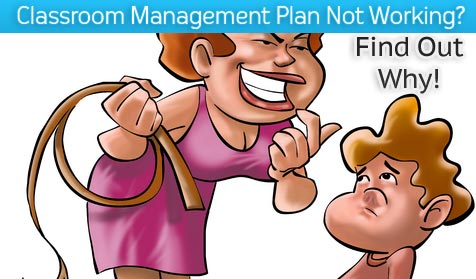Over at smartclassroommanagement.com I frequently receive emails from teachers asking why their classroom management plan isn’t working.
If you’re like them, it can be incredibly frustrating. You spend hours reviewing your plan with your students, you give reminders every day, and yet, it still doesn’t stem the tide of misbehavior.
If this is you, it’s a good bet you’re making one or more of the following mistakes:
 You let students decide your fate.
You let students decide your fate.
If you believe you’re at the mercy of your students, then you’ll always struggle with classroom management.
The fact is, you decide how your students behave, not them. The reason they’re not behaving the way you want them to is because of how you’re managing your classroom. Coming to terms with this is the first step to gaining control.
 You don’t model your plan.
You don’t model your plan.
Modeling is powerful teaching, especially when done in a highly detailed way.
Instead of merely verbalizing your plan, show your students what you expect from them by putting yourself in their shoes. Pretend you’re a student and act out what acceptable and unacceptable behavior looks like. Let there be no doubt about what is and isn’t okay in your classroom.
 You don’t really follow through.
You don’t really follow through.
Most teachers who struggle with classroom management think they follow through, but in reality, they don’t.
Try this experiment: Take a hard look at your rules and consequences and decide for one full day that you’re going to enforce them exactly as they’re written. You’ll know within one hour if you’re really following through as you should.
 Your classroom is boring.
Your classroom is boring.
Consequences aren’t effective in curbing misbehavior if your students don’t enjoy being in your classroom.
If they’re bored and uninspired, then they’re not going to care if you send them to time-out. It’s that simple. Time-out only works if your students feel like they’re missing something.
 You give reminders.
You give reminders.
A reminder is something that should happen before a rule is broken, not after.
For example, a student calls out in class and you say, “Good answer, Alex, but next time raise your hand.” Reminders like this, after the fact, are ineffective. They communicate to students that your rules aren’t worth the poster board they’re written on. An effective response would be to simply enforce a consequence.
 You take misbehavior personally.
You take misbehavior personally.
Taking poor student behavior personally will cause you to yell, scold, lecture, argue, sigh, use sarcasm, and otherwise show your displeasure.
Reacting emotionally like this causes resentment, distrust, and, ultimately, more frequent and more severe misbehavior. This is perhaps the biggest mistake teachers make.
 Your procedures are weak.
Your procedures are weak.
Your students need to know what to do and how to do it during every minute of the school day.
If they’re idle or wondering what to do, they’ll misbehave. Thorough, well-taught procedures relieve the teacher of stress and cut opportunities for misbehavior in half.
 You cause excitability.
You cause excitability.
Rushing through your day, talking too much, micromanaging, overreacting, stressing-out, worrying about this and that.
It all creates tension in the classroom and causes students to become excitable and prone to misbehavior. The solution: relax, breathe, slow down, and stay calm. Your students will mirror whatever energy you bring to the classroom.
 Your students dislike you.
Your students dislike you.
If your students dislike you, you’ll have little influence over their behavior choices.
If your students like and respect you, however, they’ll want to please you, making classroom management a lot easier. This is why building rapport and trusting relationships with your students is so important.
 You don’t have leverage.
You don’t have leverage.
Leverage is the real secret to classroom management and the reason why managing behavior appears easy to some teachers.
It comes down to this: if you can create a learning experience that students feel privileged to be part of, then you have the leverage — through your classroom management plan — to ask for and receive exactly the behavior you want from your students.
There you have it.
I know some of these ten mistakes can be difficult to consider. No one likes to think that their students dislike them or that their classroom is boring. But in order to create the class you really want, you have to confront your areas of weakness.
The good news is this: eliminate these mistakes, and you’ll never have to worry about classroom management again.
This is a guest post by Michael Linsin
Michael Linsin is the author of the award-winning book Dream Class: How To Take Any Group Of Students And Transform Them Into The Class You’ve Always Wanted.
For more of Michael’s articles, visit smartclassroommanagement.com.
Want to write a guest post?
Please contact us at [email protected] with your ideas!
P.S. If you enjoyed this article, please help spread it by clicking one of those sharing buttons below. And if you are interested in more, you should follow our Facebook page where we share more about creative, non-boring ways to teach English.








